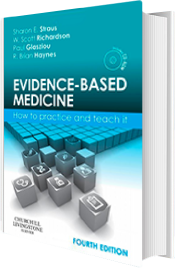Every time we see a patient, we need new information about some element of the diagnosis, prognosis or management. Because our time to try to find this information is often limited, we need to be very efficient in our searching. To achieve this efficiency, we need to become skilled at formulating clinical questions.
Tips on How to Formulate Questions
Consider the questions that arise from the following scenario:
You admit a 65 year old man with a stroke. On examination you find that he has mild weakness of the right arm and right leg and bilateral carotid bruits. You send the patient for carotid doppler ultrasonography and subsequently receive the report that he has moderate stenosis (50-69% by NASCET criteria) of the ipsilateral carotid artery. You’ve noticed in the pile of journals that is accumulating in your office that there has been some recent literature addressing surgical versus medical therapy for patients with symptomatic carotid stenosis but you are unsure what the results of these studies indicate.
Think about this scenario and about what questions arise from it. Write down your questions on a piece of paper.
When this patient scenario was encountered on our clinical service, the housestaff generated several clinical questions including:
- Can ASA decrease the risk of stroke?
- Does a carotid bruit predict significant carotid stenosis?
- How effective is a carotid endarterectomy in someone with moderate carotid stenosis?
Note that these questions ask for specific knowledge about the diagnosis and management of the patient. Well-built clinical questions should have 4 components
- Patient or Problem
- Description of the patient or the target disorder of interest.
- Intervention
- Could include: Exposure, Diagnostic test, Prognostic factor, Therapy, Patient perception etc.
- Comparison Intervention
- Relevant most often when looking at therapy
questions - Outcome
- Clinical outcome of interest to you and your patient
Returning to the 3 questions that we posed above, how can we make them into well-built clinical questions?
Let’s look at the first question:
- Patient or Problem
- 65 year old man with a stroke and moderate carotid stenosis.
- Intervention
- ASA
- Comparison Intervention
- Placebo
- Outcome
- Stroke
Now we can use this to formulate our clinical question:
In a 65 year old man with a stroke and moderate carotid stenosis, can ASA decrease the risk of another stroke compared with no treatment?
Try formulating a well-built question yourself using the last 2 questions that were posed by our housestaff.
- Does a carotid bruit predict significant carotid stenosis?
- How effective is a carotid endarterectomy in someone with moderate carotid stenosis?
Write your questions down on a piece of paper.
Compare your questions to the questions we formulated:
Does a carotid bruit predict significant carotid stenosis?
- Patient or Problem
- 65 year old man with a stroke
- Intervention
- Carotid bruit
- Comparison Intervention
- Doppler ultrasonography or angiography
- Outcome
- Carotid stenosis
In a 65 year old man with a stroke, how precise and accurate is the presence of an ipsilateral carotid bruit for diagnosing significant carotid stenosis compared with doppler ultra sonography?
- Note: there are other variations of this question; for example, we could have asked about angiography.
- How effective is a carotid endarterectomy in someone with moderate carotid stenosis?
- Patient or Problem
- 65 year old man with stroke and moderate carotid stenosis
- Intervention
- Carotid endarterectomy
- Comparison Intervention
- Medical therapy
- Outcome
- Stroke
In a 65 year old man with stroke and moderate carotid stenosis, can carotid endarterectomy decrease the risk of stroke compared with medical therapy?
- Note: there are variations for this question; for example we could have asked about other outcomes like death.
Further Reading
- Sackett DL, Straus SE, Richardson WS, Rosenberg W, Haynes RB. Evidence-based medicine: How to practice and teach EBM. Chapter 2. Churchill Livingstone:Edinburgh, 2000
- Richardson WS, Wilson MC, Nishikawa J, Hayward RSA. The well-built clinical question: a key to evidence-based decisions [Editorial]. ACP J Club 1995; 123: A12 – A13.
- Richardson WS. Ask, and ye shall retrieve [EBM Note]. Evidence Based Medicine 1998; 3: 100 – 101.

